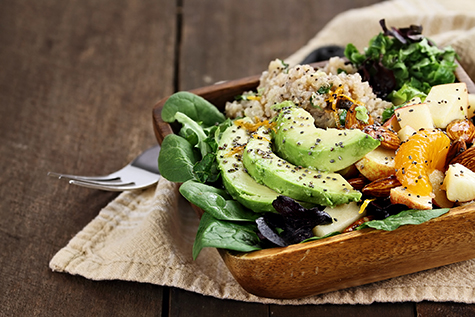Are Vegetarian Diets Healthy?

Today, many people have adopted a vegetarian diet or are considering a switch. Reasons range from disease prevention to concern for the environment.
A typical vegetarian diet not only has less saturated fat and cholesterol than a meat-based one, but it also provides a number of beneficial plant polyphenols, many of which have only been recently identified.
However, there are some potential deficiencies to consider as well.
Below, we’ll explore the possible pitfalls and how to avert them if going “meatless” is your thing.
First, Let’s Define Vegetarian
A vegetarian diet technically contains no animal products, but a number of people who call themselves vegetarians consume fish and even poultry. Those who eat eggs and dairy are known as ovo-lactovegetarians.
Do Vegetarians Get Enough Quality Protein?
While plants provide an abundance of nutrients, their ability to supply amino acids (the building blocks of protein) is limited. Eggs, for example, have a full spectrum of amino acids, earning them the title of “the perfect protein,” to which all other sources are compared.
 Because some plants (particularly grains) are higher in the essential amino acid arginine, and others (beans and legumes) are higher in lysine, the combination of both was recommended to obtain a complete source of protein. According to author Frances Moore Lappé, these combinations are typical in cultures around the world.
Because some plants (particularly grains) are higher in the essential amino acid arginine, and others (beans and legumes) are higher in lysine, the combination of both was recommended to obtain a complete source of protein. According to author Frances Moore Lappé, these combinations are typical in cultures around the world.
For example, beans with rice are a staple of the Mexican diet. In India, you’ll typically eat lentils and naan bread, and in the Middle East falafel patties made of chick peas are served with pita bread. Lappé suggested that a moderate amount of dairy could be added to a meal to have a complete protein source.
Decades later, Lappé admitted that it was not necessary to combine foods in order to get enough protein if one is eating a healthy diet. Nevertheless, the quality and quantity of protein in a vegetarian diet is still a valid concern.
Where Protein Supplements Fit In
For those who don’t have the time to consider the amount of protein in every meal, protein powders blended into shakes and smoothies are an excellent choice.
Pea, soy, and rice protein powders are the natural choice for vegans, and whey protein is a healthy option for lactovegetarians.
Watch Out for Vitamin B12 Deficiencies
Another nutrient that vegetarians should be concerned about is vitamin B12, which is mainly found in animal products. A deficiency can cause fatigue, memory loss, nerve problems, confusion, and even dementia.
While injectable vitamin B12 may be the optimal way to supplement, more convenient (and less painful!) options are available. Taking vitamin B12 sublingually (under the tongue) is a better way to absorb it than swallowing.
Iron Deficiencies are Also Common in Vegetarians
Although the need for iron has frequently been exaggerated and too much is actually unhealthy, vegetarians are often iron-deficient.
Iron is of particular importance to children and for women during their reproductive years. Of course, blood testing can rule out a deficiency.
Zinc is another mineral that can be insufficient in some vegetarian diets. Fortunately, it can be easily obtained through supplementation.
The Bottom Line
Is a vegetarian diet healthy?
Yes, it definitely can be … as long as it contains quality protein and adequate amounts of vitamins and minerals.
